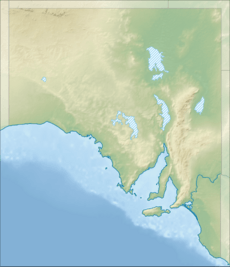Bon Bon Reserve facts for kids
Quick facts for kids Bon Bon ReserveSouth Australia |
|
|---|---|
|
IUCN Category II (National Park)
|
|
| Nearest town or city | Roxby Downs |
| Established | 2008 |
| Area | 2,164.53 km2 (835.7 sq mi) |
| Managing authorities | Bush Heritage Australia |
| Website | Bon Bon Reserve |
| See also | Protected areas of South Australia |
Bon Bon Reserve is a huge protected area in South Australia. It covers about 2,164 square kilometers, which is bigger than many cities! This special place is west of Roxby Downs. A group called Bush Heritage Australia (BHA) owns and looks after it. Bon Bon Reserve is super important because it connects other protected lands like Yellabinna Regional Reserve and Wabma Kadarbu Mound Springs Conservation Park. This helps animals move safely between these areas.
Contents
What is Bon Bon Reserve?
Bon Bon Reserve is a large area of land set aside to protect nature. It's not a national park run by the government. Instead, it's a "private protected area." This means a non-government group, Bush Heritage Australia, bought it to keep it safe forever. They work hard to protect the plants and animals that live there.
History of Bon Bon Reserve
For about 150 years, Bon Bon Reserve was a sheep station. This means it was a big farm where thousands of sheep lived. Between 1970 and 1989, about 15,000 sheep lived there on average. Sometimes, there were even more than 23,000 sheep!
In 2008, Bush Heritage Australia bought the land. The Australian and South Australian governments helped them pay for it. The previous owner, Paul Blight, wanted the land to be managed in a way that helped nature. He had already tried to keep the number of sheep low so the plants could grow back. He wanted the property to continue being looked after for the environment.
In 2013, the government officially named the area 'Bon Bon' as a locality. This made it an official place on the map.
Landscape and Plants
Bon Bon Reserve has many different types of land. You can find dry woodlands, areas with mulga shrubs, and wide plains covered in bluebush plants. There are also salt lakes.
One of the most interesting features is Lake Puckridge. It's a big lake, about 8 km long and 4 km wide. But it's usually dry! It only fills up with fresh water about once every ten years. When it does, it becomes a very important spot for many waders and waterbirds. These birds come from far away to feed and rest there. The reserve also has special trees called Sandalwood.
Animals of Bon Bon Reserve
Bon Bon Reserve is home to many amazing animals. Some of them are quite rare or "threatened." This means their numbers are getting low, and they need protection. Animals that live here, or are thought to live here, include:
- The plains-wanderer, a small, shy bird.
- Major Mitchell's cockatoo, a beautiful pink and white parrot.
- The chestnut-breasted whiteface, a tiny bird.
- The thick-billed grasswren, another small bird that hides in the grass.
- The southern hairy-nosed wombat, a unique burrowing animal.
Protecting Bon Bon Reserve helps these special animals survive and thrive.
Why Bon Bon Reserve is Protected
Bon Bon Reserve has a special "protected area status." This means it's part of Australia's National Reserve System. It's protected forever because Bush Heritage Australia has promised to keep it safe. This promise is called a "conservation covenant."
The reserve is also classified as an IUCN Category II protected area. This is a worldwide system that ranks how important protected areas are. Category II means it's managed mainly for protecting ecosystems and for recreation. It's like a national park, showing how important Bon Bon Reserve is for nature.
 | William L. Dawson |
 | W. E. B. Du Bois |
 | Harry Belafonte |


